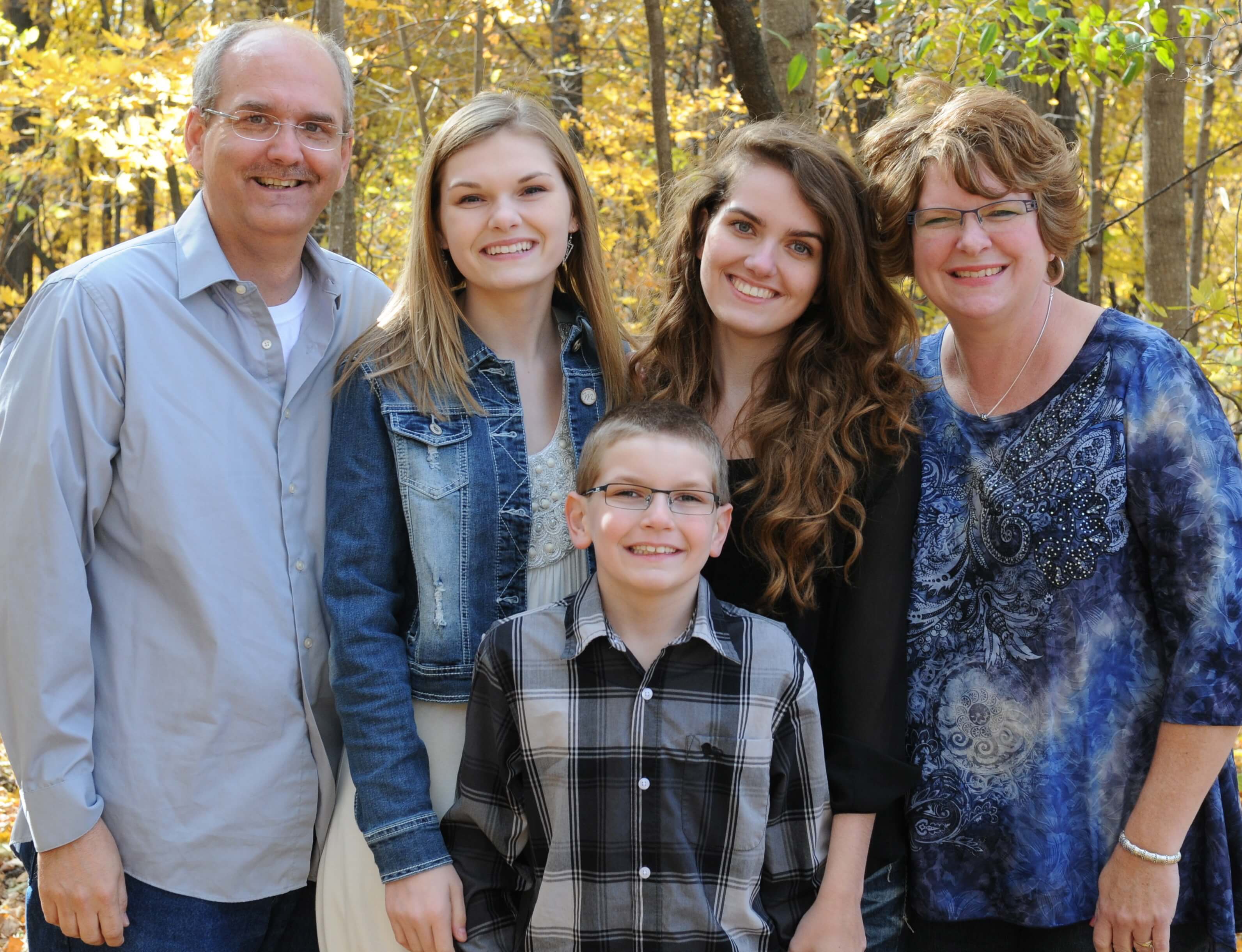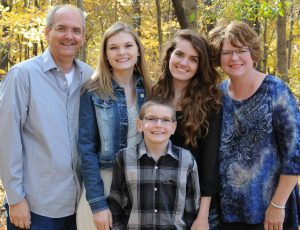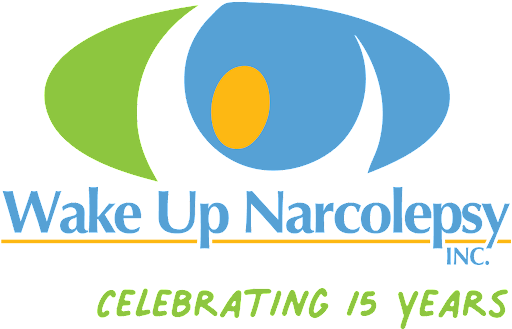
Jun 16 2019
I’m the Mom of a Teen with Narcolepsy
h in Voices of Narcolepsy
By Micki Larrabee
Note: Read the blog by Micki’s daughter and PWN Kendra here.

Dave, Morgan, Billy, Kendra, and Micki Larrabee
The Beginning
“Why us?” is not a question I have allowed myself to ask for the past three years since my daughter, Kendra, was diagnosed with narcolepsy. Allowing myself to ask that question would put me into a tailspin and down a path I do not want to go. So when “Why us?” starts to make its way to my brain, I quickly stop it and replace it “Why not us?”
A very important lesson that has presented itself during these past three years is that sometimes we are blindsided by something we never expect and it could just as easily happen to us as it could to anyone else.
Just after Kendra’s 15th birthday, our own family was blindsided. My husband and I just thought she had mono or a virus that would eventually go away. Approximately two months after the visible onset of symptoms and several doctor visits, Kendra was given the diagnosis of narcolepsy. Several months later, mild cataplexy unveiled itself.
At first we just thought she could be medicated and she would resume her normal life and all would be well again. Little did we know that we would be establishing a new normal and learning about a severe sleep disorder that we really knew nothing about.
Three Years as a Mom
As a mom, my heart reflects the very essence of each of my three children. I cannot even say the day Kendra received the diagnosis of narcolepsy was one of the worst experiences I have had being her mom. Rather it was the time I realized narcolepsy was never going to go away and she would never have her “old” self back again.
As much as I appreciate people asking me about what narcolepsy was and how she was doing, each time I spoke about it for the first year, I cried. How could I even begin to explain what it was like for her to be so intensely tired she couldn’t think straight or that a night’s sleep really wouldn’t do her justice as it did for everyone else around her? Could people truly understand that we had to adjust our lives and our household because she HAD to have a nap everyday, pay for medicines, and watch her appetite diminish to nothing right before our eyes? What could we say about what it was like to watch her get her hopes up when a medication worked only to have it become ineffective two weeks later?
And cataplexy…that is even tougher to describe…Kendra’s cataplexy comes out as weakness in her joints and muscles to the point that she drops things and becomes uncontrollably weak…who understands that, especially when it’s tied to laughter? Hallucinations and sleep paralysis were incomprehensible as well.
Primarily, it really came down to the fact that I didn’t know how to, and I didn’t want to, convey my deep sadness that my baby girl would be plagued by this evil demon forever and the very deepest part of my heart and soul was in such anguish that I hurt in a way I couldn’t even describe. So when people inquired, I did my best to explain narcolepsy and would eventually just start to cry.
By the second year, it became easier to talk about narcolepsy and cataplexy. It was by that point, I believed that everyone around me should understand exactly what narcolepsy was. The more I spoke with people about it, the more I realized how very wrong I was.
Some people got it and some didn’t get it at all. Some people wanted to hear about it and try to understand. Some really didn’t want to hear about it at all and some just didn’t want to understand. Some made the most supportive comments they could make. Some said very insensitive comments that were hurtful and thoughtless, and some people just didn’t even ask.
One of my biggest personal challenges that I faced during this time was gaining the confidence to advocate for Kendra with her school. Needing to do this made me really step out of my comfort zone, but in the end, we prevailed and made positive headway on her behalf. We also learned to organize her medical care, manage appointments, have the courage to switch doctors, and start a new medication.
As the third year began, a sense of familiarity set in. I knew what to expect with narcolepsy. Recognizing Kendra’s cycles of ups and downs and what triggers her symptoms at a higher level became much clearer. I knew when to contact the doctor and when we could handle it on our own. Mostly, I finally reached a place in my life that I could say Kendra is Kendra and narcolepsy just happens to be a part of her journey but narcolepsy certainly does NOT define her.
Perseverance
Receiving the diagnosis of narcolepsy with mild cataplexy led to the following for Kendra: multiple medication changes, extreme weight loss, headaches, dizziness, tiredness, doctor changes, an EEG, cardiac testing, psychiatric evaluation, test accommodations, homework hardships, betrayal by friends, an additional diagnosis of POTS (Postural Orthostatic Tachycardia Syndrome), doctor changes, giving up competitive swimming, and having to prioritize what she could be involved in.
However, through each and every change, though she may not have always smiled, she maintained a positive mindset. It almost seemed that when something new arose that she had to deal with, she worked that much harder at overcoming it or fighting it. This is why her power word has become ‘perseverance’. She has persevered through this entire life-altering journey.
Today, three years after being diagnosed, she continues to work very hard to allow her healthy mind, love for hockey, enjoyment of her family, desire to continue to learn, excitement for college, and the goal to become a doctor be the driving factors in her life rather than let narcolepsy take her down.
There is no way that anyone would ever ask for this diagnosis; yet she has been accepting of it, and while it definitely affects every fiber of her existence, Kendra continually works daily to not let it overtake her life.
Blessings and Hope
If it were an option, narcolepsy would not be a part of our lives; however, it is evident that we do not have control over it. As much as I despise narcolepsy and how it has changed Kendra’s life from what we had planned, personal growth and learning has occurred in my own life.
The blessings in this journey have been extraordinary: receiving a diagnosis so quickly after symptoms began, having excellent medical care, networking with wonderful new people who are in the same situation, developing a deeper understanding that so many people in this world live with hidden illnesses, having family members who are amazingly supportive, and relying on a few friends who genuinely show their care and concern.
The opportunity to recognize how resilient Kendra is has been the biggest blessing of all, and while I know there are days and time periods that will not be easy in her life, I also know that she will persevere because that is what she does.
Being in the time era we are, ‘hope’ is my own power word and I live with it everyday. The research and medical attention being brought to narcolepsy appears to be at its highest peak. People and organizations are advocating for its awareness and better forms of treatment.
Kendra’s diagnosis came at a time where people are on a mission to educate, research, and support. Because of this, I have, and will continue to have, hope for all of this attention to narcolepsy to positively benefit Kendra and everyone else affected by narcolepsy in the next several years.
